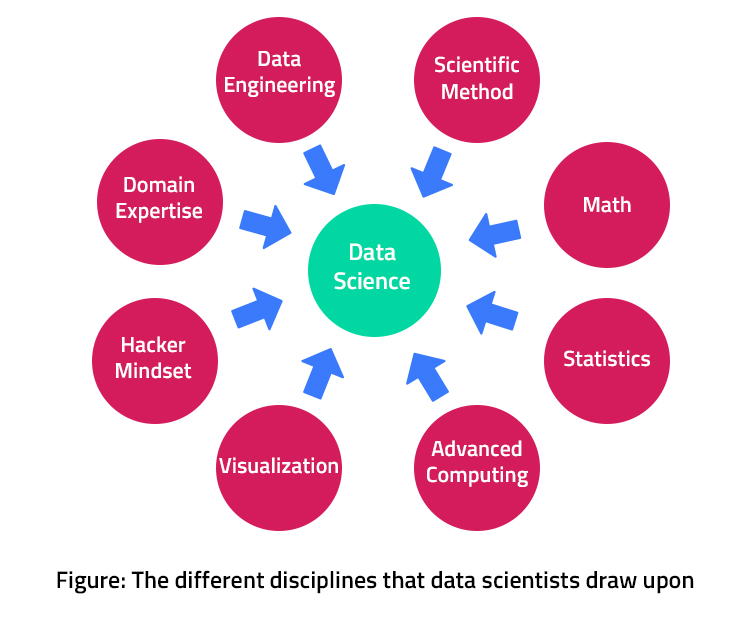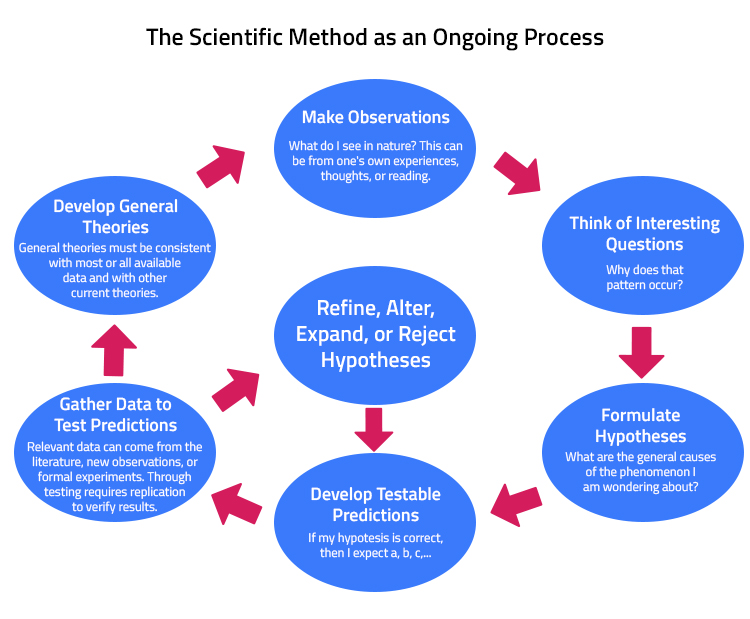For many years data science has been named one of the top jobs. Yet, if the word on the street is to be believed there is an extreme shortage of skilled data science and Python professionals. So, if you have a passion for computers, math, and discovering answers by playing around with available data, data science could be the field you could build a great, successful career in.
What is Data Science?
Data science is an interdisciplinary field that uses scientific methods, processes, algorithms, domain knowledge, and systems to extract knowledge and insights from the available structured and unstructured data. It is a concept that unifies statistics, data analysis, and other related methods.

Why does a career in data science have so much potential?
It is a challenge for companies to manage data
Businesses have a lot of data, often more than they know what to do with. And that’s where they need data science professionals. According to a recent Data Security Confidence Index from Gemalto, a large majority of businesses have said that they couldn’t analyze or categorize all the data they had stored with them. Interestingly, almost all these businesses strongly believe that if they were able to harness the potential of this data, they could gain a significant competitive edge.
Data privacy regulations change regularly
The data privacy regulations in every country are defined by their respective governments, and they are updated regularly to keep up with evolving vulnerabilities and progressing technologies. There is a growing awareness among the masses about the importance of security and privacy of the data and information that they share with different companies, and are mindful of what they allow companies to collect. With that, no company can afford to treat any data irresponsibly, and not just because of the regulations in place. They need to have skilled data science professionals in their employ, who can manage this data, and work with the security specialist to keep it safe and secure.
Data science is a constantly evolving field
Data science is a very dynamic field that is ever-evolving. There are new developments almost every day, newer ways to analyze and process data emerge regularly and companies need to keep updating the way they harness their data. With this, there are abundant opportunities for data science professionals to grow and help their organizations. In the future, data science professionals would have more specific titles that would give rise to an increased demand for professionals as well as a demand for a regular training to update skills.
The demand for data science professionals is greater than their supply can keep up with
The way technology is going, data science is growing exponentially, while the number of skilled professionals graduating from academic institutes and training organizations is growing quite linearly. Data science is a field that is going to need, and keep needing, many, many professionals to bridge the gaps and help organizations manage and secure their data. There was a time when data science professionals were good to have at companies, now they are an absolute necessity a company cannot do without.
The amount of data being generated is growing exponentially
According to a study about current and future data growth, 5 billion consumers interact with data daily, and by 2025, this number is expected to go up to 6 billion, which would represent about three-quarters of the world’s population. Data production is on the rise, and data science professionals will be essentially at the forefront of helping organizations use this data effectively.

What are the top careers in data science?
Some of the top careers in the field of data science include:
- Data scientist: These are professionals responsible for finding, cleaning, and organizing data for organizations. They analyze large volumes of complex, raw, and processed data to find patterns and draw insights that would help organizations make strategic decisions.
- Machine learning engineers: They create data funnels and deliver software solutions. They need strong skills in statistics and programming. They also need to have knowledge of software engineering. They also run relevant tests and experiments that would help monitor the performance and functioning of the systems.
- Machine learning scientists: They research new data approaches and algorithms that would be used in adaptive systems such as supervised learning techniques, unsupervised learning techniques, and deep learning techniques. They also sometimes have titles like research scientists, research engineers, etc.
- Applications architects: Application architects track the applications that are used by a company and how they interact with each other as well as the users. They also design the architecture of different applications, being involved in tasks like building the user interface and infrastructure.
- Enterprise Architects: These are the professionals who would align the organization’s objectives with the technologies it would need to achieve them. They need to have a thorough understanding of the business, the domain, as well as the different technologies that would come into play so they can design effective system architecture for the organization.
- Data Architects: The job of data architects is to ensure that data solutions are built for performance and design analytic applications for multiple platforms. They not only create new database systems but they also work on finding ways to improve the performance and functionalities of existing systems.
- Infrastructure Architects: They monitor all the business systems and ensure they work optimally. They also ensure that business systems effectively support the development of new technologies and system requirements. They also sometimes have titles like cloud infrastructure architects and they oversee the company’s cloud computing strategies.
- Data Engineers: Data engineers process gathered and stored data either in batches or in real-time. They also build and maintain pipelines for a robust and interconnect data ecosystem, making sure data scientists have all accesses (to the data) they need.
- Business Intelligence (BI) Developers: Business Intelligence developers primarily deal in, as the name suggests, business intelligence. They design and develop strategies to assist the business in finding the information they need about the market, industry, competitors, or even the business to make informed decisions. They are extremely data-savvy. They use standard BI tools or develop their custom BI tools to help end-users understand the systems effectively.
- Statistician: The designation might sound scary or even too academic, but the profession is really interesting if you have the aptitude for it. Statisticians collect, analyze, and interpret data based on which they identify trends and relationships so their organizations can make informed business decisions. They also design data collection processes, communicate the information they find to the relevant stakeholders, and advise the decision-makers on devising the right strategy for the organization.
- Data Analysts: Data analysts are responsible for transforming and manipulating large data sets to meet company requirements. This could also involve tracking web analytics and analyzing the results of A/B testing. They prepare specialized reports for their organization’s decision-makers that effectively communicate trends and insights derived from data analysis that they have carried out.
- Data Translators: Data is incomprehensible to people who are not skilled at reading and analyzing it. To make it easily understandable in a way that it can be used to help decision-making and draw value requires the findings from the data to be translated into lucid communication. This could involve storyboarding, charting, or any other means that would help the stakeholders understand what the data reveals. This is the job of the data translators.
Cognixia – the world’s leading digital talent transformation company offers a world-class training and certification course in data science. This data science with python training covers all the essential concepts of data science as a field, as well as the fundamentals of Python that would be needed for an aspiring professional desirous of building a career in data science. This course covers:
- Introduction to data science
- Data science project lifecycle
- Basics of statistics
- Measures of central tendency
- Measures of dispersion
- Discrete and continuous distribution functions
- Advanced statistics concepts – sampling, statistical inference, testing of hypothesis
- Introduction to Python programming, Anaconda, and Spyder
- Installation and configuration of Python
- Control structures and data structures in Python
- Hands-on applied statistics concepts using Python
- Functions and packages in Python
- Graphics and data visualization libraries in Python
- Introduction to machine learning
- Machine learning models and case studies in Python
The data science course is taught by data science and Python experts who have many years of experience under their belt. Cognixia also offers complete technical support as well as a dedicated POC for every data science training participant. At the end of this data science training, participants need to appear for an assessment. Once they clear the assessment, participants are awarded a data science certification by Cognixia validating their skills in the field of Data science and Python. To know more about our data science with Python certification course, visit here.

